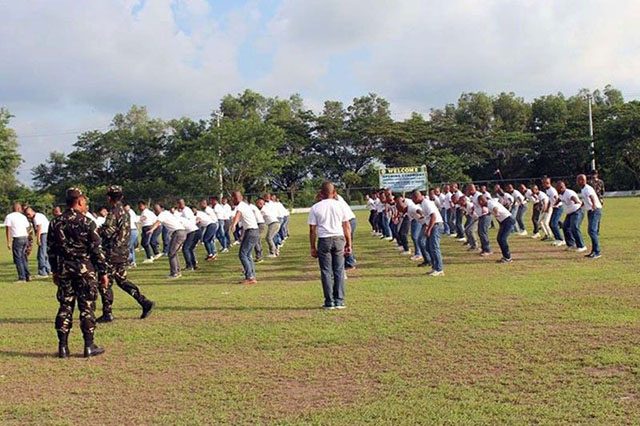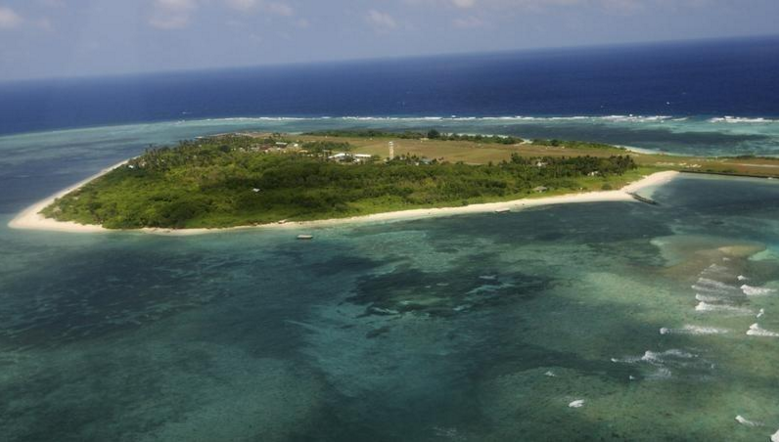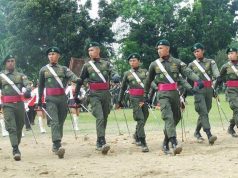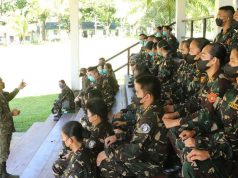
People questioned President Rodrigo Duterte’s sense of patriotism when he stated that he wanted to make the Reserve Officers’ Training Corps (ROTC) program mandatory to Grades 11 and 12 students.
In a speech at the 35th anniversary of the Army Reserve Command at the Camp Regio de Dios, Duterte mentioned that he is mulling to create an executive order that would mandate Grades 11 and 12 students to undergo ROTC if there is no action from the Congress.
“I likewise encourage Congress to enact a law that will require mandatory ROTC for Grades 11 and 12 so we can instill patriotism, love of country among our youth,” he said.
“Ewan ko kung madala ito ng EO. ‘Pag madala ng EO siguro, executive order, baka mapilitan ako if they do not act on it. I said that this is a constitutional requirement that you must prepare to defend your country,” Duterte added.
The chief executive stated that it is the youth’s “duty to defend the identity and the preservation of the Republic.”
His statements were met with criticism from Filipinos who questioned his sense of patriotism and compared it to his stance in the maritime dispute with China. They also noted what it means for the Philippines’ sovereignty rights.
Gusto ni Duterte ng mandatory ROTC for patriotism daw. First, he said he skipped ROTC by faking illness. Second, his sycophancy towards China isn't so patriotic. See, this idiot is a laughable hypocrite.
— Scribbler (@ororoschild) November 22, 2018
The madman says ROTC should be made mandatory again because every citizen has the obligation to protect the country, and yet here he is selling our country to China. What kind of fools does he take us for?
— pipes (@adaptedboy) November 22, 2018
Previously, the draft of the memorandum of understanding (MOU) on the joint oil exploration of China and the Philippines in the West Philippine Sea received criticisms from Filipinos.
Maritime law expert Jay Batongbacal called it “an agreement to agree” on jointly exploring the territories and “a deal to be open to deals.”
Duterte has been reluctant to enforce a ruling by the United Nations Permanent Court of Arbitration dismissing China’s nine-dash line claim that encompasses almost the entire South China Sea, including the Spratly Islands and Scarborough Shoal.
China has conducted massive land reclamation activities in the Spratlys to turn submerged rocks and reefs into artificial islands capable of supporting military bases, airstrips and ports.

Filipinos fishermen and other sea vessels in the West Philippine Sea have been repeatedly shooed away by the Chinese Coast Guard even though they are within the Philippines’ 200-nautical-mile exclusive economic zone.
Duterte has sought to forge closer ties with the Asian giant despite widespread criticism that it would not be in the best interests of Filipinos.
To instill sense of patriotism
A mandatory ROTC program was initially pitched by Duterte during the 2016 presidential elections. Two months after he took office, talks of it surfaced in a Cabinet meeting.
Presidential legal counsel Salvador Panelo said, “(Duterte wants the) ROTC revived kasi wala na raw yung — hindi na nai-instill ‘yung discipline, ‘yung love of country. Wala na raw disiplina ‘yung young generation kaya na-aadik sa drugs. Walang spirit of love of country.”
By August 2017, the chief executive approved the motion to amend Republic Act 9163 or the “National Service Training Program (NSTP) Act of 2001.” Under the amendment, students of Grades 11 and 12 would be required to undergo the ROTC program.
The current law states that ROTC is a voluntary option for students under the National Service Training Program.
It allows them to choose different tracks in fulfillment of their NSTP to be taken during two semesters of an academic period. They can opt to enroll in ROTC, the Civic Welfare Training Service or the Literacy Training Service program.
ROTC used to be mandatory among college students when former President Manuel Quezon issued Executive Order 207 (series of 1939) that obliged schools to have a reserve force for the establishment of an independent Philippine Army under the National Defense Act of 1935.
However, it became voluntary when an ROTC cadet from the University of Santo Tomas died under the hands of his own officers for exposing the corruptions of the unit.
It prompted lawmakers to create the Republic Act 9163, where ROTC enrollment was no longer required and students can choose other tracks for fulfilling their requirements on national service.








